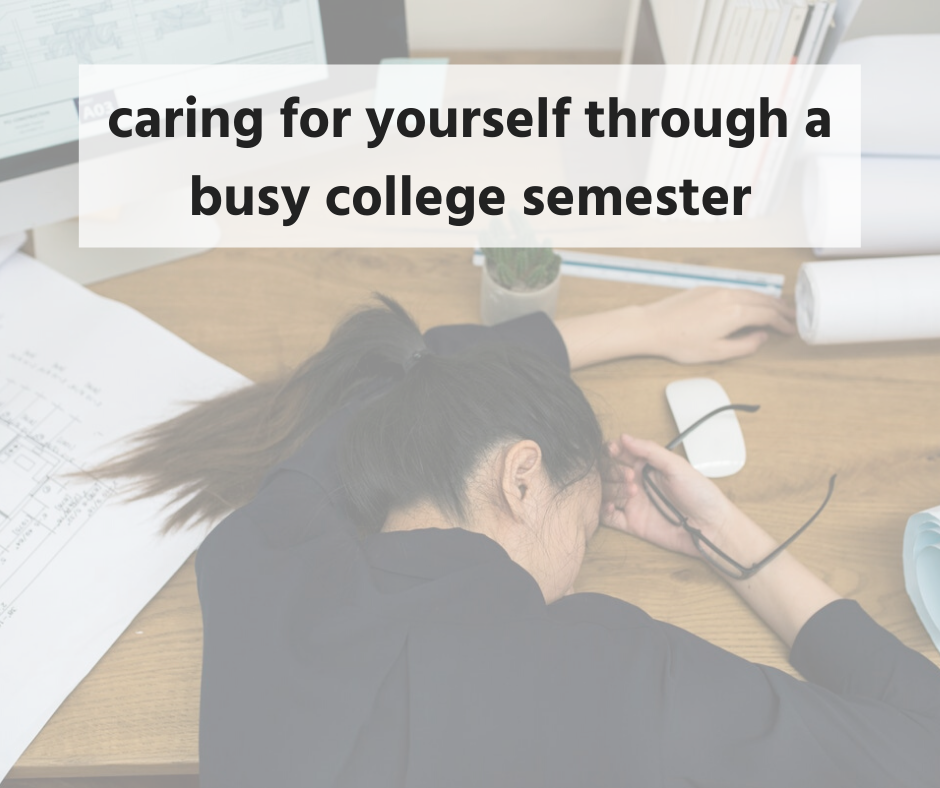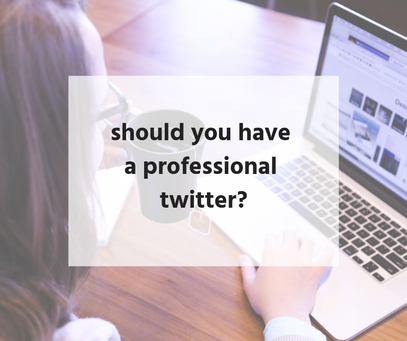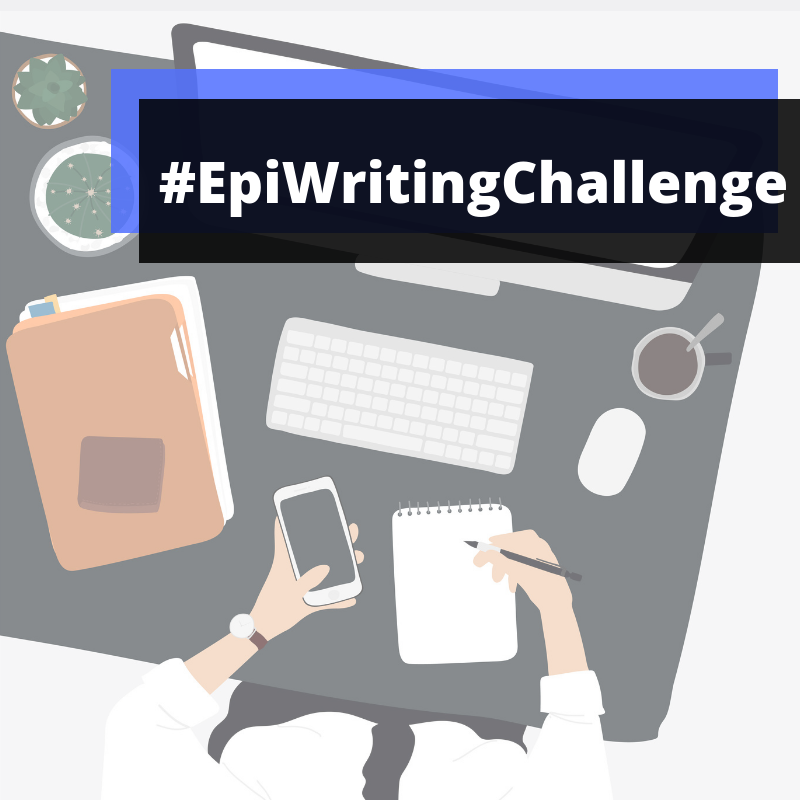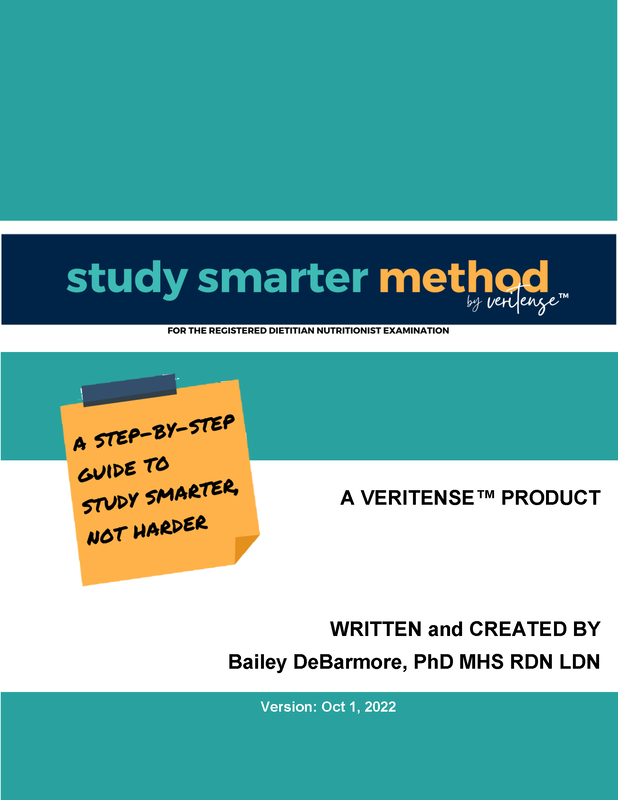|
As we launch headfirst into a new semester, take advantage of the slow first week of classes to make a strategic plan for this term. Think about how you studied for your exams last semester - what worked, what didn't?
Today I share 3 tips to consider when revamping your study strategy.
0 Comments
With an arctic blast dropping temps to 100-year record lows across the US, it truly feels like winter is here!
When we think about our winter health we often think of cold, flu, and mental health. Being indoors more often means we're more likely to catch a bug from our cubicle neighbor, and less time spent outdoors and/or less sun exposure can contribute to feelings of isolation and depression. College is a unique life experience - independence from family members and high school teachers comes with new responsibility over your time and self-care.
Peer pressure to socialize at the expense of your school work can lead to you falling behind, or the abrupt change in classroom style may lead you to struggle with your material. Being away from home can be lonely, and the added stress of school can make you shy away from meeting new people. Some quick tips? Pay attention at orientation to what resources your school has available for you, from tutoring to counseling, to interest groups to help meet new friends. Tutoring can help you learn how you learn, overcoming difficulties in new coursework, while counseling can help you identify negative thoughts and replace them with positive ones. You can also learn positive self-care coping strategies. Finally, develop your time management skills by utilizing assignment and quiz dates to stay up on your materials, blocking your time around classes to be efficient while on campus. Read on for more tips.
Writing a literature review is daunting (hey, writing a dissertation is daunting!)
While dissertation formats vary between universities and disciplines, most (if not all) require a literature review. In this post I'll walk you through my process in developing an organization system that helped me write my dissertation literature review. It's a long post, but I wanted it all to be in one place for you so it's not broken up into different articles. First, I'll walk you through my back story in the dissertation literature review process, and describe my overall system of organization. Then, I'll describe 2 methods to take you from reading articles to taking notes to organizing your notes into themes. Lastly, I'll wrap up with thoughts on how to continue your literature review in a cohesive and transparent way. All external links open in a new window.
Last week I talked about whether online courses are the right choice for you and I've written before about how to balance work and hobbies, and even how to leverage your hobbies.
Whether you're a naturally curious individual, always eager to learn something new in your downtime, or whether you want to bring more meaning to your life by learning something new, it's never too late to start. Whether you're looking for a new career, want to learn a new skill for fun, or want to increase your value at work, online courses (also called online training) are one way to achieve that.
Some examples of what completing online courses could achieve for you? Not only is there a variety of courses offered online, from animal care courses distance learning to foundation healthcare courses to basic data science and programming, no matter what you're looking for, you can find it through online course websites or online schools. Before you jump in, decide if online courses are the right choice for you.
Having work-life balance isn't just something to think about, but something you should take steps to achieve. Breaking the constant cycle of working with hobbies, vacation, and any other activities or experiences that you're passionate about will help you be happier, healthier, and productive at work. When your entire identity isn't wrapped up in a single job, you build both your confidence and your resiliency.
Did you know that 70% of Millennials experience imposter syndrome?
Imposter syndrome affects high-achieving individuals who fear they aren't as intelligent as others perceive them to be. Do you worry that you'll be "exposed" in your workplace? That you don't belong? Successful professionals are most likely to struggle with imposter syndrome, particularly if they have trouble internalizing success. Do colleague's compliments roll off your shoulders, but criticism reverberates for weeks? Being modest about your success is healthy as long as you own your accomplishments - don't poke holes in your success! You deserve the recognition that you crave. Impostor syndrome from J. Emilio Flores on Vimeo. It's important to have a life outside of school, and that life might consist of family, friends, and hobbies. Whether you engage in your hobbies for joy or for cash or for both, you can take some steps to leverage that hobby for some side hustle cash while in graduate school.
If you're musically inclined, today's post is for you. Let's talk about leveraging your love of music. If you're fed up with your current job or just looking for something different, know that there are many ways to make a career change. Don't get overwhelmed by the idea of more training - it's easier than ever to learn skills that you need from home, by accessing courses online! You can travel, earn money, and train for the career that you want. Photo by rawpixel.com from Pexels
Do you feel like something's been missing in your life? Are you tired of wasting time in the rat race? As a graduate student, it's easy to get bogged down in minutiae of your tasks, feel overwhelmed by never-ending projects, or with unrealistic deadlines. Balancing work and life is important - but what are you going to do during that "life" part?
Image by lisa runnels from Pixabay
If you're unhappy with your current job, consider these 3 potential solutions.
Anxiety is "an emotion characterized by feelings of tension, worried thoughts and physical changes like increased blood pressure."
- American Pyschological Association definition (source)
Anxiety is a normal and often healthy emotion. However, when a person regularly feels disproportionate levels of anxiety, it might become a medical disorder.
Anxiety disorders form a category of mental health diagnoses that lead to excessive nervousness, fear, apprehension, and worry Anxiety disorders affect 40 million people in the United States. It is the most common group of mental illnesses in the country. However, only 36.9 percent of people with an anxiety disorder receive treatment. from Medical News Today (source) Talking with my medical care provider to come to a solution, and to keep adjusting my treatment as life takes its course, has made an enormous difference in my day-to-day life. If you are struggling with anxiety, I encourage you to speak with your medical provider about it. With doctor visits getting shorter and shorter, I recommend preparing beforehand with a list of questions and answers and being sure to initiate the conversation. This article has information on what to expect when you go to the doctor to discuss your anxiety, and ways you can prepare beforehand.
Before we get started I wanted to make another point. Anxiety looks different for different people (and often is not visible at all). Talking about mental health is important to remove stigma and break down barriers, but realize that if you do find someone else with anxiety, their symptoms and treatment options may not be the same as yours. This article outlines the varied signs and symptoms of anxiety - take a look.
Now, let's talk about some lifestyle changes you can make to manage your anxiety (with and without other treatments). Lifestyle plays a large role in our physical health and wellbeing as well as our mental and emotional state. You may feel like you’re being pulled in a hundred different directions, trying to balance family life, work deadlines, financial pressures, and personal wellness.
By identifying your priorities and taking concrete steps to take back control, you can feel better both at work and at home.
New promotion available at your office? You know you're prepared, intelligent, and capable, and they do, too.
You've done a great job so far. Good grades in school, great university, maybe even some graduate work. You may have even picked up on your teacher and tutor's skills that helped them get to their own successful positions. You networked all the while, and kept in touch with the experienced and knowledgeable people you met, just like the blogs say you should. Having your boss recognize you as a competent employee is different than being first on their mind for a promotion. Do you have the qualities that will help you rise to the top? Most of us have done things we’d rather a future employer didn’t know about. It may be that we made stupid mistakes when we were young. Perhaps we got in with a bad crowd during our impressionable years. Either way, these aren’t exactly things we’re in any rush to put on our resume.
You may be surprised to find out that most successful people had a circuitous journey to get where they are today. I’m still a doctoral student, but knowing that I’m interested in an industry position after graduating I regularly conduct informational interviews with people who do what I want to do. Not only do I learn about the day-to-day of their job and the culture of their company, but I learn about how they got there. And like myself, their journeys are almost never a straight path down the middle. Sometimes a curly-cue career path means you’ve done things that aren’t always relevant to your dream job. Leaving out those experiences may leave your resume looking patchy. So what do you do? Do you include them, or leave it blank and cross your fingers you can talk it out in the interview? If you choose to leave a position off of your resume, be prepared with a positive, straight-forward answer for the interview (phone or in-person). If you took time off to travel, go back to school, health reasons, or family commitments, come up with a strong statement that you’re comfortable with. Luckily there are great resources online to help you explain your resume gaps the right way. The number one rule when it comes to resume gaps is not to brush them under the rug. Make a decision to address them up front in your cover letter, or be prepared to answer questions about gaps in an interview. You can’t go wrong either way as long as you’re prepared. Whether or not school was your “thing” growing up, the education we received from childhood onwards shapes who we thought we could be, who we became, and who we strive to become.
The academic discourse we experienced in school trains us to ask questions, consider multiple perspectives, and deliberate to make decisions. We learned something new every day when we were in school, and if you’re in graduate or professional school now, hopefully you still do. If you’re thinking about going back to school, seriously consider your options. Don’t let naysayers discourage you. Additional training or a graduate degree can improve your employability. Training in a new discipline that you’re passionate about can bring joy to your job. The medical field includes countless roles other than traditional physician and nursing positions. If you are interested in a medical career outside the traditional path, read on for some ideas.
Are you looking for an online tutor?
The Internet is a great resource to find a variety of services, and education is no different. Whether you’re looking to hire a tutor for your child or for yourself, there are a variety of options. Personally, I had a math tutor in middle school that helped me catch up, an SAT tutor in high school, and chemistry tutors in college. A straight-A student, no one would have ever guessed – but it’s important to ask for help when you need it. Since college I’ve given back, tutoring high school students in a variety of subjects and general life skills, as well as teaching nutrition students how to study for the RD exam. So why hire a tutor? Why not just hit the books a little harder? Tutors provide one-on-one support – the tutor can adapt their teaching style to your learning needs. Teaching in a classroom is efficient because one teacher supports many students, but is not always as effective as one-on-one help. You can take extra time to focus on certain topics that get glossed over in a lecture, and do more practice on your weak spots. Whether you're looking to go back to school or acquire new skills for a promotion or job change, there are concrete steps you can take to improve your employability and value.
Whether meeting a mentor-to-be for coffee and conversation or whisking through the second round of interviews for your dream job, making a great first impression is no longer limited to the meet-and-greet.
In this digital age, networking occurs as much online as it does in person. And people are more likely to reach out to you after Googling your name than from a business card at a conference. What comes up for your name? Creating a professional online image is more than classifying your personal social media as private. Let's talk about the combination of your in-person impression and your online footprint.
Today I'm going to tell you why I ditched my work purse [permanently] for a work backpack.
Yes, a work backpack. While this is a bit different than my typical professional productivity post, this choice has made a big impact on my life both in the day-to-day and for big events like conferences. So let's get started. I gave a seminar just last week in my department about professional Twitter. Science communication has expanded to include Twitter, and social media is not longer relegated to personal life.
What's the difference between professional Twitter and non-professional Twitter? It's not a different site, it's just having an account for a different purpose. Read more to read what I have to say about should you or shouldn't you; key aspects of a professional Twitter; benefits of professional Twitter; and finally - a free download of my guide to setting up your professional Twitter. Working from home is on the rise, according to the 2017 US Census. From increased work-life flexibility and employee productivity to decreased real estate costs and overhead, remote work (or "telecommuting") offers benefits for both employee and employer. Whether you're a grad student like me, self-employed working out of a home office, or telecommuting part-time, you've encountered the benefits and the challenges of working home. Challenges like distractions. In this post we'll talk about several distractions you may be all too familiar with, and how to help nip them in the bud. Find 2020 statistics on remote working 15 Trends for Remote Working in 2021 With a third of the US workforce now working from home, many have moved to a new city or state - "Zoom Towns". Travel Experts from Million Mile Secrets put together an article on the most popular destinations for remote workers. If you can work from anywhere, why not live where you vacation? Coverage put together an article to help you decide if you can make the move to your dream city including stats on living costs and your basic necessities, like a strong WiFi signal. An article from AllConnect highlights our desire to reconnect with nature in this increasingly virtual need, and so they put together a list of the 10 states that offer the best combo of outdoors and internet access. |
popular postsLike what you read?
categories
All
archives
July 2024
This website uses marketing and tracking technologies. Opting out of this will opt you out of all cookies, except for those needed to run the website. Note that some products may not work as well without tracking cookies. Opt Out of Cookies |































 RSS Feed
RSS Feed